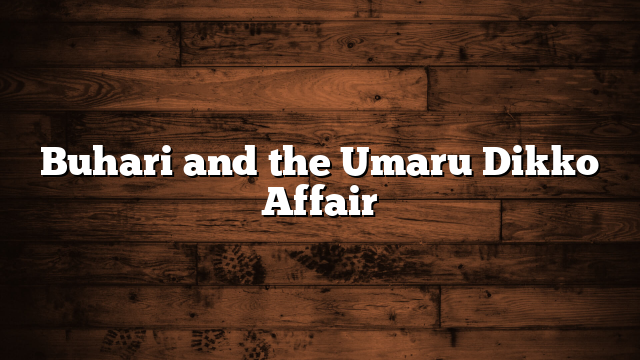In the early hours of 31st December, 1983, a military coup coordinated by key officers of the Nigerian military led to the ousting of the democratically elected government of President Shehu Shagari and the installation of Major General Muhammadu Buhari as head of state.
One key figure in the Shehu Shagari government was Umaru Abdulrahman Dikko, a controversial politician, and Shagari’s brother-in-law.
Umaru Dikko was the Minister of Transportation in the Shagari administration from 1979 till December 31, 1983, when the government was toppled by the military.
Dikko, as well as some ministers, fled to exile as the new military regime began to clamp down on the previous administration’s officials accused of embezzling public funds during their time in office.
An outspoken critic of the junta, Dikko fled the country reportedly dressed as a priest.
The Buhari government accused him of corruption and of stealing millions of dollars from a rice distribution program he oversaw, charges he denied.
The regime went after him, in an off-the-book covert operation, by Nigerian security operatives, supported by their Israeli counterparts.
An Israeli former Mossad agent, Alexander Barak, was recruited to lead the kidnap team. It included a Nigerian intelligence officer, Major Mohammed Yusufu, and Israeli nationals Felix Abitbol and Dr Lev-Arie Shapiro, who was to inject Umaru Dikko with an anaesthetic.
Mossad sources across Europe failed to locate Dikko. However, Mossad Director-General Nahum Admoni decided that Dikko was probably in London, which had become a haven for Nigerian exiles critical of the new regime.
On 30th June 1984, a Mossad agent spotted Dikko in London. He then tailed Dikko on foot to his house in Porchester Terrace. Nahum Admoni was immediately informed, and he ordered surveillance on the house. From then on, the house was constantly watched, while the Nigerians, using their London high commission as a base, prepared a kidnapping operation.
On 4th July 1984, Dikko was kidnapped in front of his home while he was out for a walk, and taken away in a van driven by Major Yusufu. He was then drugged into unconsciousness by Shapiro. However, the abduction was witnessed by Dikko’s secretary, Elizabeth Hayes, who quickly notified the authorities.
He was driven to the Stansted airport, where he was to be flown as “diplomatic baggage” to Lagos to face charges of allegedly stealing $1 billion.
His captors handcuffed him, drugged him, and stuffed him, in chains, into a specially made crate with a doctor by his side maintaining a tube on his throat to keep him alive.
The plot flopped when Charles Marrow, a British Customs officer, suspected foul play, got the police to abort the trip.
The British police promptly detained Nigeria Airways aircraft and arrested four persons in connection to the issue.
The Buhari junta denied any role in the failed mission, which resulted in a major diplomatic spat between Nigeria and Britain for two years.
In retaliation, the Nigerian government also detained a commercial British Caledonian plane carrying 220 passengers in Lagos.
The then British Prime Minister, Margaret Thatcher, protested to the Federal Military Government of Nigeria over the kidnapping “which is seen as an inexcusable, if not inexplicable abuse of diplomatic status.”
The four men – three Israeli nationals and one Nigerian national – were charged with kidnapping – a common-law offence and with administering drugs with intent to kidnap.
When the trials were finally concluded, Alexander Barak, an Israeli described as the leader of the kidnap group, bagged 14 years jail term. Two of his compatriots, Lew Arie Shapiro and Felix Abitbol, received 10 years each, while Mohammed Yesufu, a Nigerian, was sentenced to 12 years.
The British government also implicated two members of the Nigerian High Commission diplomatic staff members, Peter Oyedele, and Okon Edet, as having engaged in activities “incompatible with their status.” They requested Messrs Oyedele and Edet to leave the United Kingdom within one week.
Nigeria responded similarly by asking that two persons from the British High Commission also leave Nigeria within the same period. Nigeria further asked the British High Commissioner to Nigeria to return to London while Mr Hananiya was recalled and reassigned to another post.
Both The Nigerian and Israeli governments have always denied involvement in the kidnapping.

